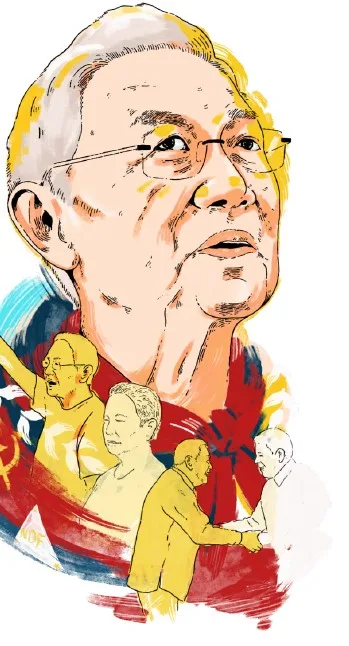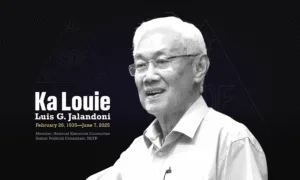What was it like writing a book about Luis Jalandoni? I’ve never written about the experience, but I’ve thought about it a great deal over the years. Every time I browse through the shelves and rows against rows of biographies of famous people in Fully Booked, I remember how it was, and how different Ka Louie’s life had been in comparison.
I had agreed to give it a try—to write Ka Louie’s biography. Ka Crispin “Ka Bel” Beltran’s biography had just been released, and I was not really keen to begin writing another biography because it was an exhausting ordeal. It’s much more tiring than writing fiction. But Ka Coni floated the idea, and I felt so honored that she would even ask me, consider me for the task.
I stayed for a week in Utrecht, in the walk-up apartment where Ka Louie and Ka Coni Ledesma lived. It was a cheerful and airy space they kept, and for six hours every day, Ka Louie and I would talk about his life and all the memories that he valued and kept through all that he had gone through in his life.
We sat in the kitchen where they had a round table with wooden chairs. Ka Coni had given me a big notebook to use—more like a ledger really, the kind that companies gave away as gifts during holidays—and two pens. I did not have a tape recorder, and I did not want to use one because I’d realized before that recording interviews sometimes made me lazy and drift off, confident that whatever parts of conversations I’d lost track of would be stored in the now antediluvian gadget.
(Now I regret not having recorded our interviews, if only to have his gentle voice to listen to as he described the happy afternoons of his privileged youth and the dangerous evenings of the life he eventually chose and embraced.)
I was determined to keep a strict schedule of interviews because I liked working under pressure on projects I really care about. Ka Louie agreed, and we began the morning after I arrived from Groningen where I had been living at the time.
After the first day, I felt comfortable already about asking Ka Louie about anything—even how he fell in love with Ka Coni. (They were both shy and embarrassed about it— so much so that I had to speak to Ka Coni solo, out of her husband’s earshot! It was both sweet and funny.)
So Ka Louie talked, and I listened and scribbled like crazy on the notebook. His voice was gentle, rising and falling in a rhythm that reminded me of Pachelbel’s Cannon in D playing on a music box. Even when sharing a memory where he faced danger or felt his soul breaking, his voice retained its clarity like a small crystal bell. During breaks I saw that outside it was fall, and the leaves that littered the pavement were red and brown, and sometimes when I stood near the windows, I could feel how cold it was. I remember thinking to myself—my God, I am actually listening to the stories of one of the greatest revolutionaries my country has ever had the good fortune of having, and he just cooked me lunch. (FYI, at the time when I had this thought, lunch was a piece of steamed salmon, rice, and a side of alugbati from the alugbati vine that grew from a pot by their kitchen window.)

Back in university, I once heard a multi-awarded writer talk about his experience as a ghostwriter for politicians. He was candid, even blunt, about it. He said that it wasn’t necessary to like—or even respect—the people he was hired to write for. Sometimes, it was just about the paycheck. Writing, for him, was a job like any other: you do the work, take the money, and once the book is printed, you move on. If it wasn’t something you were proud of, you simply forgot about it.
That conversation stayed with me over the years, and I found myself thinking about it often while writing Revolutionary. Except this time, the contrast couldn’t have been sharper. I felt a deep sense of fulfillment knowing that I would never have to write about anyone mediocre and pretend—on paper—that they were extraordinary. I was writing about the Luis Jalandoni. And there was no need to exaggerate, embellish, or invent. His life is one that truly deserves to be documented and shared—especially with those who believe that a life well-lived is one devoted to humanity’s highest ideals: kindness, compassion, justice, and the unrelenting pursuit of social liberation.
And maybe that’s what makes writing about someone like Ka Louie such a privilege. It wasn’t a job—it was an act of solidarity, of bearing witness to a life that continues to inspire action and hope. It was an experience that transcended the typical research and prose of a historical account; it was an immersion into a life lived with unwavering purpose. To be entrusted with his memories, to sit and listen as he revisited the pivotal moments that shaped him into the intellectual, humanitarian, and revolutionary he became, was a profound honor.
I was consistently awestruck by the clarity and intactness of his recollections. Not only were his own views and feelings remarkably vivid, but his impressions of the people he encountered, those whose lives intersected with his, were equally sharp. It was as if a meticulously kept mental archive was being opened, each file perfectly preserved and easily accessible. His life unfolded as a genuine story with a clear, compelling narrative, each chapter flowing seamlessly into the next.
Ka Louie was also so humble. Despite a lifetime dedicated to fighting for others, despite countless good deeds and significant contributions, he was never full of himself, never boastful. In fact, it was often a challenge to keep the interviews focused solely on him. He would invariably, and with genuine reverence, steer the conversation towards the lives of other activists and revolutionaries. Their struggles, their sacrifices, their unwavering commitment—these were the narratives he wanted to highlight, the individuals who had earned his undying respect and loyalty. It was a testament to his character: a man who, despite his own greatness, consistently centered the collective struggle and the contributions of those around him. This deep-seated respect for his comrades, this unwavering solidarity, was a cornerstone of his being and a powerful lesson in true leadership.
Despite everything he had accomplished, he remained grounded. Revolutionaries like him rarely allow themselves to feel pride—not because their work isn’t monumental, but because they always believe there’s more to be done, more people to serve, more change to fight for. For them, the work is never really finished.
The Unseen Cost of Goodness
Beyond the privilege of his insights, the countless hours spent interviewing Luis Jalandoni revealed a profound truth: to be genuinely good, to dedicate one’s life to the well-being and genuine freedom of others, is anything but easy. It demands immense personal sacrifices and navigating a path fraught with hardship. Yet, for Ka Louie, this commitment seemed to come with a striking simplicity in his manner as he shared his memories. He was always, inherently, compelled to do what was right, what was just.
What struck me most was how often “doing what was right and just” meant embarking on a long, complex, and sometimes perilous journey where one could get hurt, suffer, and even face profound loss. There were moments, while transcribing his words or crafting a paragraph, when I’d find myself catching my breath. The sheer weight and import of what I was describing—the deeds and thoughts of a man who devoted his life to serving the Filipino people completely and unselfishly—were palpable. His story wasn’t just a record of actions; it was a testament to the unyielding spirit required to walk a path of true integrity, even when that path led through immense personal cost.
In Gratitude
I will always consider writing Revolutionary one of the most meaningful achievements of my life. The many hours I spent in conversation with Ka Louie—listening as he shared memory after memory of the life he chose and embraced—will forever stay with me. I know, without a doubt, that I am a better person and a better writer because of that experience.
Why a better writer? Because I pushed myself to do justice to his story. I struggled—humbly and honestly—to find the right words to convey the depth and value of Ka Louie’s experiences. His life wasn’t just his own; it was a mirror of our nation’s long and continuing struggle for justice. His memories carried the weight of history—personal, political, and collective. Writing about him meant writing about the countless sacrifices made by ordinary Filipinos living in a country where genuine social justice remains an aspiration, not yet a reality.
And why a better person? Because Ka Louie taught me, through his words and his example, that life is a series of choices. And those choices—made with clarity, courage, and commitment—are what ultimately give our lives weight and meaning. His life was a testament to the truth that a life given to serving a cause greater than one’s self is the best, and even happiest, kind of life.
Thank you, Kasamang Luis Jalandoni, for all that you were and all that you continue to be in our hearts and minds—a true revolutionary, and an enduring inspiration.













